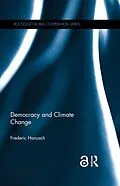This book demonstrates that overall stronger democratic principles and democratic qualities tend to correlate with improved climate performance. Beginning by outlining a general concept of democratic efficacy, the book provides an empirical analysis of the influence of the quality of democracy on climate change performance.
Autorentext
Frederic Hanusch is a postdoctoral researcher at the Institute for Advanced Sustainability Studies (IASS), Potsdam, Germany.
Klappentext
This book demonstrates that overall stronger democratic principles and democratic qualities tend to correlate with improved climate performance. Beginning by outlining a general concept of democratic efficacy, the book provides an empirical analysis of the influence of the quality of democracy on climate change performance.
Zusammenfassung
Now in its Third Edition, Practical Bomb Scene Investigation explores the investigative process that improvised explosive device (IED) specialists undertake at the scene of an explosion. Providing easy-to-understand, step-by-step procedures for managing and processing a bomb scene, it enables investigators to find the evidence and then make sense of what is found. The book is not only a roadmap on how to find and collect evidence and assess the scene, but also provides instruction on identifying the bombmaker's signature through latent print, DNA, explosive residue, metallurgical, and toolmark examination and forensic analysis.
Inhalt
Chapter 1. Introduction
Part I The Bases for the Analyses
Chapter 2. The unknown influence of democratic qualities on climate performance
Chapter 3. The concept and the operationalization of democratic efficacy
Part II. An Empirical Analysis of the Democracy-Climate Nexus
Chapter 4. Analysis I: more leads to more -positive statistical trends
Chapter 5. Analysis II: Canada's Kyoto Protocol process, 1995-2012 - a case study perspective
Chapter 6. 1995-1997: Chrétien makes use of the prerogative
Chapter 7. 1998-2002: futile consultations
Chapter 8. 2003-2005: undemocratic unpredictability
Chapter 9. 2006-2012: democratic weakening and climate change as a shield issue
Chapter 10. Discussion analysis II: linkages between democratic quality and climate performance
Part III. Synergy
Chapter 11. Overall discussion
Chapter 12. Conclusion
Afterword
